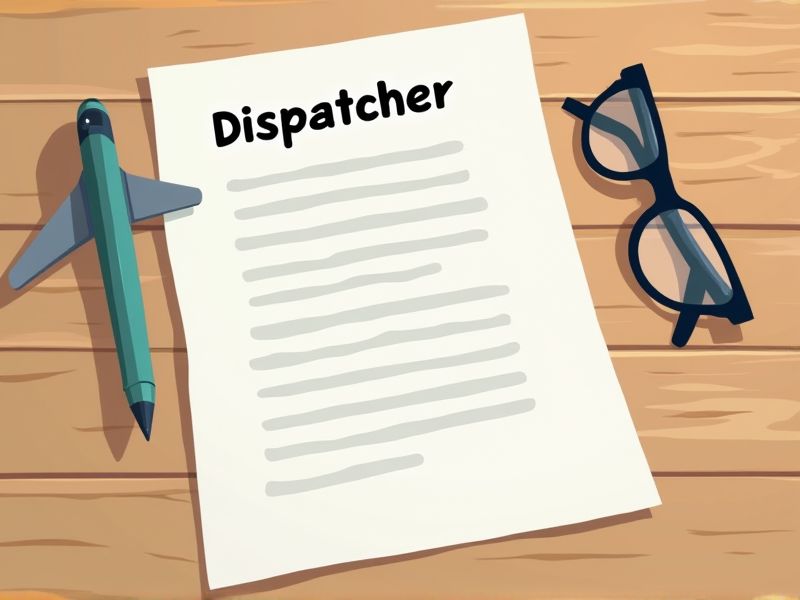
Airline Dispatchers play a crucial role in ensuring the safety and efficiency of flight operations. Certification requirements are necessary to provide them with the specialized knowledge and skills to manage various operational challenges and regulations. These certifications validate the dispatcher's ability to handle critical tasks like flight planning, weather analysis, and emergency response. Key certifications needed for an Airline Dispatcher include the FAA Aircraft Dispatcher Certificate and the ICAO Aviation Safety Certificate.
FAA Aircraft Dispatcher Certification
Obtaining the FAA Aircraft Dispatcher Certification is essential because it ensures that dispatchers meet rigorous safety and operational standards set by the aviation industry. This certification provides the dispatcher with the authority to legally plan and release flights, ensuring adherence to federal regulations. The certification confirms that a dispatcher is skilled in analyzing meteorological and technical flight data, which is crucial for flight safety and efficiency. It also mandates proficiency in emergency procedures, enabling dispatchers to effectively manage unforeseen issues during a flight.
EASA Flight Dispatcher Authorization
EASA Flight Dispatcher Authorization is needed to ensure compliance with European aviation safety regulations, which enhances operational safety. It provides standardized training and competencies, allowing dispatchers to make informed decisions under various circumstances. This authorization facilitates consistent communication and coordination with pilots, reducing the risk of errors. It also enables dispatchers to manage complex flight operations across different countries within the European Union.
IATA Airline Operations Course for Dispatchers
The IATA Airline Operations Course for Dispatchers equips professionals with the latest industry standards and regulations, ensuring they perform their duties efficiently and safely. The course enhances understanding of critical aspects such as flight planning, weather analysis, and emergency procedures, essential for operational reliability. Proper training through this course results in improved decision-making skills, directly impacting flight efficiency and safety. With constant advancements in aviation technology and regulations, keeping dispatchers updated is vital for compliance and optimal airline performance.
ICAO Safety Management Systems (SMS) Training
ICAO Safety Management Systems (SMS) Training is needed for airline dispatchers because it equips them with the necessary skills to identify and mitigate safety risks effectively. This training aligns dispatchers with international standards, ensuring consistent adherence to global aviation safety protocols. By understanding SMS principles, dispatchers contribute to a proactive safety culture, reducing the likelihood of accidents and incidents. Integrating SMS training enhances decision-making capabilities, crucial for managing complex operational scenarios in real-time.
Aviation Meteorology Certification
Aviation Meteorology Certification equips airline dispatchers with the ability to interpret complex weather data, directly impacting flight safety and efficiency. Accurate weather forecasts enable them to make informed decisions on route planning, reducing the risk of hazardous conditions. Certified dispatchers can effectively communicate potential weather-related issues to pilots, ensuring proactive measures are taken. Enhanced understanding of meteorology leads to optimized flight schedules, reducing delays and operational costs.
Aviation Regulatory Compliance Certification
Aviation Regulatory Compliance Certification is needed for an airline dispatcher to ensure safe and efficient management of flight operations. Certification guarantees that dispatchers are knowledgeable about current aviation laws and regulations, which minimizes the risk of non-compliance-related incidents. Holding such certification enhances operational reliability by ensuring that dispatchers adhere to industry standards and safety protocols. Compliance certification also increases the trust and confidence of passengers and crew in the airline's commitment to safety.
Aviation Security Awareness Certification
Aviation Security Awareness Certification equips airline dispatchers with the necessary knowledge to identify and mitigate security threats, ensuring the safety of passengers and crew. Regulations by aviation authorities mandate continuous security training to comply with international standards. Certified dispatchers contribute to a culture of vigilance, enhancing the overall security framework of the airline. Enhanced awareness of potential threats enables proactive decision-making and improves crisis management efficiency.
Crisis and Emergency Response Management Certification
Airline dispatchers play a critical role in ensuring the safety and efficiency of flight operations, requiring them to be equipped with crisis management skills to handle unexpected situations. Certification in Crisis and Emergency Response Management provides dispatchers with the necessary knowledge to effectively coordinate communication between flight crews, air traffic control, and emergency services during emergencies. This certification enhances the dispatcher's ability to make quick, informed decisions that prioritize passenger safety and operational integrity. Trained dispatchers with such certification contribute to minimizing risks and mitigating the impact of crises on airline operations and passenger experience.
Fatigue Risk Management Certification
Fatigue risk management certification is needed for airline dispatchers because it helps decrease the likelihood of errors caused by fatigue, thereby enhancing overall safety. This certification provides dispatchers with the necessary tools and techniques to recognize signs of fatigue, which can compromise decision-making during critical flight operations. Understanding fatigue-related risks is essential in reducing potential incidents or accidents attributed to human error. Implementing a systematic approach to manage fatigue directly impacts operational efficiency and regulatory compliance within the aviation industry.
Crew Resource Management (CRM) Certification
Crew Resource Management (CRM) Certification is needed for Airline Dispatchers because it enhances communication skills, which directly impacts flight safety and operational efficiency. Improved communication minimizes misunderstandings between crew members and dispatchers, reducing the potential for operational errors. CRM training also fosters teamwork and collaborative problem-solving, which are crucial when handling unexpected challenges in aviation. Airlines see better adherence to safety protocols and a reduction in human error incidents as a result of effective CRM practices.
Summary
You gain an edge in the competitive job market when you obtain certifications as an Airline Dispatcher. Certification enhances your technical skills, making you a more efficient planner and communicator. Airlines can expect increased operational safety and efficiency due to your upgraded expertise. Your credentials often lead to better career opportunities and salary prospects.
